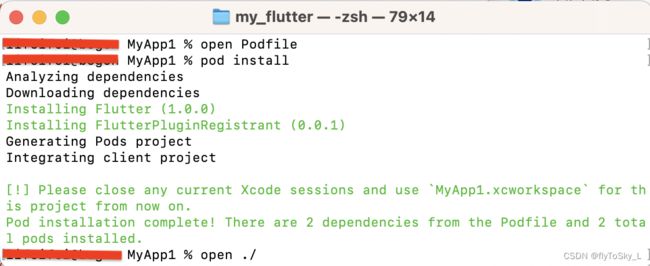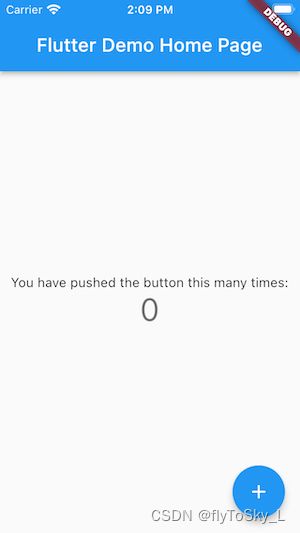原生嵌入flutter模块(ios篇)
方式一:需要xcode 、cocopad 、flutter
同级目录下:
iOS项目:MyApp 子目录 Podfile文件
flutter模块:flutter create --template module my_flutter
Podfile文件
platform:ios,'11.0'
flutter_application_path = '../my_flutter'
load File.join(flutter_application_path, '.ios', 'Flutter', 'podhelper.rb')
post_install do |installer|
flutter_post_install(installer) if defined?(flutter_post_install)
end
target 'MyApp' do
install_all_flutter_pods(flutter_application_path)
end
在flutter module下执行flutter run,可运行demo
在 Xcode项目下执行 pod install,效果如下
iOS代码启动flutter页面:
swift代码
import UIKit
import FlutterPluginRegistrant
@main
class AppDelegate: UIResponder, UIApplicationDelegate {
// lazy var flutterEngine = FlutterEngine(name: "my flutter engine")
func application(_ application: UIApplication, didFinishLaunchingWithOptions launchOptions: [UIApplication.LaunchOptionsKey: Any]?) -> Bool {
// Override point for customization after application launch.
// flutterEngine.run()
return true
}
}
import UIKit
import Flutter
class ViewController: UIViewController {
lazy var flutterEngine = FlutterEngine(name: "my flutter engine")
override func viewDidLoad() {
super.viewDidLoad()
view.backgroundColor = UIColor.green
// Do any additional setup after loading the view.
}
override func touchesBegan(_ touches: Set, with event: UIEvent?) {
// let flutterEngine = (UIApplication.shared.delegate as! AppDelegate).flutterEngine
//
flutterEngine.run()
let flutterViewController = FlutterViewController.init(engine: flutterEngine, nibName: nil, bundle: nil)
// let flutterViewController = FlutterViewController(project: nil, nibName: nil, bundle: nil)需要在 AppDelegate 中代码 实现 flutterEngine
flutterViewController.view.backgroundColor = .cyan
present(flutterViewController, animated: true, completion: nil)
}
} oc代码:
#import "ViewController.h"
#import
@interface ViewController ()
{
FlutterEngine *_eng;
}
@end
@implementation ViewController
- (void)viewDidLoad {
[super viewDidLoad];
// Do any additional setup after loading the view.
self.view.backgroundColor = [UIColor redColor];
}
-(void)touchesBegan:(NSSet *)touches withEvent:(UIEvent *)event{
_eng = [[FlutterEngine alloc]initWithName:@"my flutter module"];
[_eng run];
FlutterViewController *vc = [[FlutterViewController alloc]initWithEngine:_eng nibName:nil bundle:nil];
vc.view.backgroundColor = [UIColor blueColor];
[self presentViewController:vc animated:YES completion:nil];
}
@end
方式二:通过framework,xocde 即可,不需要flutter、cocopad
仍是同级目录
iOS项目:MyApp 子目录 不需要Podfile文件
flutter模块:flutter create --template module my_flutter,执行flutter run 可见页面正常运行
在flutter目录下执行 flutter build ios-framework --output=/xxx/MyApp/Flutter
可见MyApp新增如下目录结构:
MyApp
└── Flutter/
├── Debug/
│ ├── Flutter.xcframework
│ └── App.xcframework
├── Profile/
│ ├── Flutter.xcframework
│ └── App.xcframewor
└── Release/
├── Flutter.xcframework
└── App.xcframewor在MyApp中,进行配置
- 拉入FlutterApp ,MyApp——Target——General——Frameworks,Libraries,and Embedded Content + 添加
- App.xcframework
- Flutter.xcframework
- MyApp——Target——Build Setting —— Other Librarian Flags 添加
- "$(SRCROOT)/Flutter/$(CONFIGURATION)/App.xcframework"
- "$(SRCROOT)/Flutter/$(CONFIGURATION)/Flutter.xcframework"
- MyApp——Target——Build Setting —— Frameworks Search Paths 添加
- $(PROJECT_DIR)/Flutter/$(CONFIGURATION)
代码:
import UIKit
import Flutter
class ViewController: UIViewController {
lazy var flutterEngine = FlutterEngine(name: "my flutter module")
override func viewDidLoad() {
super.viewDidLoad()
// Do any additional setup after loading the view.
view.backgroundColor = UIColor.yellow
flutterEngine.run()
}
override func touchesBegan(_ touches: Set, with event: UIEvent?) {
// let eng = FlutterEngine.init(name: "my flutter module")
// eng.run()
let vc = FlutterViewController.init(engine: flutterEngine, nibName: nil, bundle: nil)
vc.view.backgroundColor = UIColor.cyan
present(vc, animated: true, completion: nil)
}
} 方法三:通过Flutter.podspec 嵌入flutter框架
步骤同方法一类似,但是不再是导出framework。
在my_flutter目录下执行“()”部分可不添加,
flutter build ios-framework --cocoapods (--xcframework --no-universal ) --output=../MyApp/Flutter/
导出目录如下图结构所示:
MyApp
└── Flutter/
├── Debug/
│ ├── Flutter.podspec
│ └── App.xcframework
├── Profile/
│ ├── Flutter.podspec
│ └── App.xcframewor
└── Release/
├── Flutter.podspec
└── App.xcframewor在MyApp的Podfile文件中添加:
pod 'Flutter', :podspec => './Flutter/Debug/Flutter.podspec'
并在,MyApp——Target——General——Frameworks,Libraries,and Embedded Content + 添加
App.xcframework即可
这里如果遇到提示--cocoapods 报错
--cocoapods is only supported on the dev, beta, or stable channels. Detected version is xxxx-pre.xxx
切换flutter,
flutter切换命令:
查看 :flutter channel
切换到beta: flutter channel beta
此外,模拟器不能进行Release 运行,因为dart目前不支持
Your app does not run on a simulator in Release mode because Flutter does not yet support outputting x86/x86_64 ahead-of-time (AOT) binaries for your Dart code. You can run in Debug mode on a simulator or a real device, and Release on a real device.
总结:方法一是podhelper.rb 脚本会把你的 plugins, Flutter.framework,和 App.framework 集成到你的项目中,这里需要flutter环境和cocoapods的依赖,每次更改Flutter plugin,需要在flutter module下执行flutter pub get ,再在MyApp目录下pod install ;方法二是将flutter module 以framework形式添加到项目中,这里不需要flutter环境、cocoapods的依赖,每次变动flutter module 代码,都需要更新framework;方法三,介于方法一和方法二之间,方法三不需要flutter环境,但需要cocoapods管理项目,flutter module 变动,需要更新Flutter.podspec。

